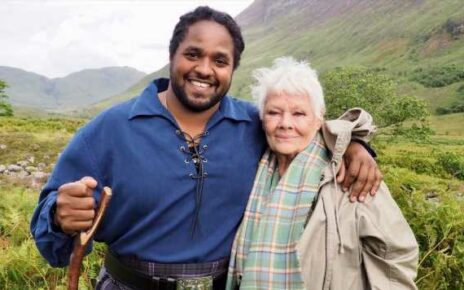Don’t believe everything you read. More than a hundred years after King Richard III was killed during the Battle of Bosworth Field, the last important fight of the War of the Roses and widely considered the end of the Middle Ages, William Shakespeare wrote his “Richard III,” which dramatized the king’s life, works, and death, turning him into something of a monster in the process. But what if, Stephen Frears’ “The Lost King” wonders, everything we thought we know about Richard, much of it straight from The Bard’s pen itself, was wrong indeed?
Many people have noodled on that same thing in the centuries since his death, including the nearly century-old Richard III Society, which is comprised of not just fans of the ruler, but fans who are dedicated to reassessing his reputation. But “The Lost King” is mostly concerned with just one fan: Philippa Langley, a real-life amateur historian who helped lead the charge to find Richard’s body in a Leicester car park a decade ago. Sounds like a story ripe for the movies, right? In keeping with the thrust of “The Lost King,” much of what follows is somewhat hard to believe, both trumped up and terribly dry, and fascinating in fractured pieces.
“The Lost King” finds Philippa (Sally Hawkins, wonderful as ever) at a crossroads: her job doesn’t respect her, her marriage has long since ended, and her chronic fatigue is mostly misunderstood by everyone around her. When Philippa and one of her sons take in an evening show of “Richard III,” Philippa is so struck by a) the performance of a young actor (Harry Lloyd) in the title role and b) the way Shakespeare imagines Richard’s feelings about his apparent ailment (it was long rumored that he was a hunchback) and how the world sees him, that she basically ditches the rest of her life to learn more about the embattled king.
Philippa is not alone in her obsession, and she soon falls in with the Richard III Society (hard-core fans of the king are called “Ricardians”), but even they aren’t fully equipped to assist Philippa in what becomes her singular focus: finding Richard’s body and, presumably, helping set right his legacy in the process. Hawkins, whose slight stature befits the character (a woman, ill, often overlooked), still lends her characteristic pop to the proceedings.
Still, it’s a rather mirthless affair, as Philippa trudges back and forth between her home in Edinburgh and Richard’s final resting place in Leicester, intent on convincing anyone who will listen that she alone has a lead on where the king was buried. Sexism, bureaucratic issues, budgetary issues, and just plain disbelief threaten to snuff out Philippa’s dream, even as she becomes more fully immersed in the world of a dead king. Early on, “King Richard” (in the form of Lloyd) starts appearing to Philippa, first unsmiling and silent, eventually sort of charming and effusive. If Philippa can rectify Richard’s legacy, she thinks, perhaps that will give meaning to her own.
Screenwriters Steve Coogan (who also co-stars as Philippa’s ex-husband) and Jeff Pope have taken a few liberties with the material, an understandable enough choice in the general scope of cinematic fluff-ups, but one that feels distinctly inappropriate given the theme of the film itself. Don’t believe everything you read? More like, don’t believe everything you see. The broad strokes of Philippa’s story are indeed factual, but curious details have been cut loose, like that the real Langley wasn’t just compelled to research Richard III because of some cosmic connection between the pair, but because she actually — and this is funny — hoped to eventually write a screenplay about him.
This screenplay (with no Langley credit) folds together some characters and outright eliminates others — again, common biopic practice, but one that feels off-kilter because of the film’s own aims — like another key woman, Annette Carson, who also targeted the car park as a likely burial ground, published an entire book about it, and joined up with the real Langley and and historian John Ashdown-Hill (played in the film by James Fleet) to launch the Looking for Richard Project. “The Lost King” often zeroes in on rejections Philippa faced because of her gender and supposed inexperience, and to snip another person out of this narrative who faced the same problems feels inherently wrong. (Another ding against the script, particularly one from the typically amusing Coogan, there’s not much lightness here, let alone actual comedy.)
But the stuff that is true feels ripe for the movie treatment, like that Philippa was overcome by a “feeling” when she first stepped into the car park, convinced it meant that Richard III’s body was there somewhere. She trusted her gut and did the research to back it up, and only Hawkins could be compelling enough to make standing around, wide-eyed in the middle of a dreary parking lot, or going up against seemingly endless meetings filled with bored people, feel like something very important indeed. Even that element, however, might have been amped up for the movie treatment: a recent article in The Guardian reported on potential controversy regarding other members of the archaeological team who felt demeaned by the film’s treatment. Oops.
By its final act, however, “The Lost King” picks up enough steam to power through the inevitable discovery of the grave, the distasteful treatment of Philippa by her supposed comrades, and a final battle for Richard’s soul that only Philippa could have waged. And yet even this last 40 or so minutes highlights how plodding the rest of the film is, how dull this story about literal grave-digging feels, when nothing less than elemental truth and a singular mission in life are reduced to, well, just a story, and not even an altogether real one at that.
Grade: C+
“The Lost King” premiered at the 2022 Toronto International Film Festival. IFC Films will release the film at a later date.
Source: Read Full Article

